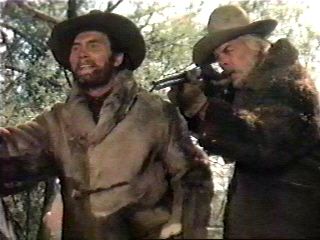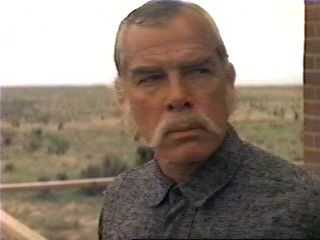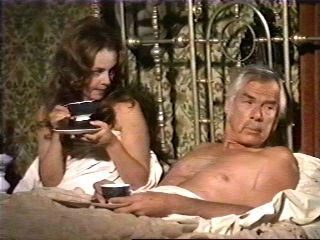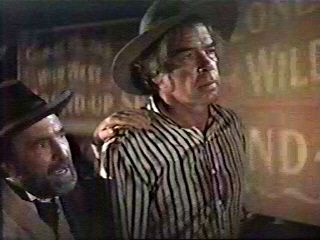
|
|
|
|
|
|
|
|
|
|
|
|
|
(1970) Director: William
Fraker
Since the first time I watched it from a TV recording I
made one late night, I've been meaning to review Monte Walsh,
though until recently the issue either kept slipping my mind, or
instead a movie of more urgency was suddenly in front of me and waiting
to be viewed and reviewed. What Unlike Shane or pretty much every other cinematic western, Monte Walsh depicts the west in a more honest light, showing that things there and then weren't nearly as clean-cut as Hollywood (or Italy) usually portrays them, and that life on the frontier was more of a struggle to keep food in your stomach than struggles with desperadoes. This is especially true during the period when the movie starts, the last days of the true cowboys. Winter has just ended when Monte Walsh (Marvin) and his buddy Chet (Palance) ride down from the mountains after traveling from the ranch they worked at during the winter. But when they get to the area where they usually work this time of the year, they immediately see things are very different from what they once were. The streets of the town are full of unemployed men; an especially tough winter had wiped out many of the ranches in the area, and the few that are left have all been sold to a major cattle firm based in the east. Still, Monte isn't especially worried - nothing's changed for him or Chet. The extensive experience he and Chet have as cowhands land them jobs with a friendly former boss of theirs (played by Jim Davis), and Monte's long time "saloon hostess" girlfriend Martine (Moreau) is still in town, still silently and patiently waiting for the day Monte will settle down with a real job. For a while, Monte is able to forget about the possibility that his lifestyle is coming to an end, but then there are turns in his life that even Monte cannot ignore. A depressed fellow cowhand commits suicide in front of his eyes. Orders from the east force his boss to lay off some members of the already diminished workforce on the ranch, including Shorty (Mitch Ryan), another long-time buddy of Monte. Work for Martine becomes so scarce that she has to move to another town 40 miles away - and then has to resort to dishwashing to earn money. Chet suddenly quits his beloved cowboy life altogether to marry the town's widow and become a hardware salesman. All this while, Monte repeatedly and stubbornly refuses to admit that the day of free ranges and the drifting cowboy may be coming to an end. "As long as one cowboy is taking care of one cow...!" he blurts out at one point. But when the changes in his life start taking a greater (and tragic) turn, even he seems to be starting to feel the same sense of bewilderment and helplessness as those young men he saw on the street earlier that year. From the above description, you might understandably
conclude that Monte Walsh is a depressing movie. It
isn't. For one thing, it's an American movie and Another reason why the movie is nowhere as depressing as the description makes it is because pretty much all the characters in the movie - no matter how hard life eventually starts getting for them - are given opportunities to improve their lives, opportunities that will enable them to put food on the table if they will only try something different. You can sympathize with Chet's unhappiness of his situation, because you can see that though his decision to settle down was against his wandering spirit, he does have a sense of responsibility and is able to look ahead and see that refusing to settle down might eventually place him in a spot where he's even more unhappy. Compare that bite-the-bullet attitude with a number of other characters in the movie. One unemployed cowboy mentions that he did find work on a railroad, but quit because he didn't like the work. When Shorty is laid off, more than once he is giving a stake to start a new life and advice as to where jobs can be found, but all the same he chooses the life of a cattle rustler and a plain thief. Monte himself at one point is offered a high-paying job that most people in that period would kill for, yet in the end he declines the opportunity. He doesn't actually say why, but you can tell by his face that it's against his way, and he wants to remain a wandering cowboy. So it hard to get depressed about a movie where the
characters have a lot of choice in the despondent situation they find
themselves in. Yet What the movie is really about is not just a look at some specific characters, it's a look at how various people can react to the same bad circumstances. The results in real life are never as black and white as other movies can make it out to be, as Monte Walsh clearly shows us. In other hands this might have been depressing and boring, but in his first time in the director's chair acclaimed cinematographer William Fraker manages to present the entire package in another kind of good light. As I mentioned before, he mixes comedy with the tragedy so any bitterness then can be swallowed yet will be properly digested in our minds, and reassures us by showing us every so often that even in the darkest of times there is always some hope left (the last scene in the movie captures this feeling perfectly.) He is also given the challenge of giving the movie a seamless flow when instead of having a typical story with standard plot turns and developments, he instead is working with more or less a series of vignettes - and succeeds. Every scene manages to flow effortlessly into the next, and remarkably, a feeling like that coming from an evolving story is generated. Though there is still very little story, everything seems to happen just where and when it should happen. Visually, he also manages to generate a feeling of
realism, with buildings of peeling That quibble aside, more than 30 years after it was made, Monte Walsh still holds up extremely well. It's not only excellent in its own right, but after all this time it still feels fresh and original. Not just as a western, but any particular drama. When was the last time you saw tough guys like Marvin and Palance playing more relaxed and human characters? The atypical nature of this movie makes it not just something new and different for western fans, but potentially gives it appeal to those who don't like westerns. Adult western haters may appreciate the movie's focus being more on characters than any of the many standard western elements. Kids and teenagers might go for the movie as well. Though there are a few mild "adult" elements to be found in the movie, they are not presented in an exploitive manner. Plus, the feeling of alienation and helplessness may strike a cord with youths. It goes without saying that western fans will love this movie, but even if you are not one of them, give Monte Walsh a try, with the knowledge that you'll be seeing something different than usual. You just might find you like westerns after all.
Check for availability on Amazon (VHS) See also: Bad Company, Chino, A Minute To Pray, A Second To Die |
 got me to finally sit down with the movie
again and make notes not long ago was a small article that I came
across during a bout of web surfing - an article that announced that
filming would soon commence on a made-for-cable remake starring Tom
Selleck. Though remakes generally are significantly poorer than the
original, I wasn't terribly bothered by the fact itself a remake would
be made of this particular movie. After all, Tom Selleck has acquitted
himself well in made-for-cable westerns in the past, and cable dramas
in the past few years have generated a very positive response from
critics as well as audiences. Plus, the article announced that this
remake would this time, unlike the original movie, stick very closely
to the source material, that being the same-named novel by Jack Shaefer
(who also wrote Shane). So this is actually one remake I admit
I'm interested by and that I look forward to watching. Still, even if
this upcoming remake is as good as I hope it will be, I do hope its
presence will not completely blot out the remaining shred of memory of
the original movie. Maybe it doesn't follow the original novel closely
- so what? It's still a darn good movie, one that should have received
classic status by now but strangely hasn't.
got me to finally sit down with the movie
again and make notes not long ago was a small article that I came
across during a bout of web surfing - an article that announced that
filming would soon commence on a made-for-cable remake starring Tom
Selleck. Though remakes generally are significantly poorer than the
original, I wasn't terribly bothered by the fact itself a remake would
be made of this particular movie. After all, Tom Selleck has acquitted
himself well in made-for-cable westerns in the past, and cable dramas
in the past few years have generated a very positive response from
critics as well as audiences. Plus, the article announced that this
remake would this time, unlike the original movie, stick very closely
to the source material, that being the same-named novel by Jack Shaefer
(who also wrote Shane). So this is actually one remake I admit
I'm interested by and that I look forward to watching. Still, even if
this upcoming remake is as good as I hope it will be, I do hope its
presence will not completely blot out the remaining shred of memory of
the original movie. Maybe it doesn't follow the original novel closely
- so what? It's still a darn good movie, one that should have received
classic status by now but strangely hasn't. not a Canadian
so-called movie. And while the movie does touch upon a period that was
indeed downbeat for many people, it doesn't go as far to say that
things were completely without hope, and there weren't any positive
moments. Even though life starts to get more difficult for Monte and
his friends, there are still some occasions when they have the
opportunity to take a break from their struggles and find some personal
enjoyment. Monte and Chet have several opportunities to share a
personal joke and laugh about it (giving viewers a rare opportunity to
see Marvin and Palance laugh without malice.) In fact, most of the
memorable moments in the movie are those with a good amount of humor in
them, like when Monte, Chet, and the other cowhands gang up on the
ranch's smelly cook so they can give him a much-needed bath (as well as
the subsequent scene where the sneaky cook gets revenge on them.) The
showstopping scene is when later on in the movie Monte rediscovers an
untamed horse the long-departed Shorty could never break, and decides
(in what may be an unconscious act to prove to himself that the cowboy
is not dead) decides to tame that beast once and for all. The
subsequent results are unforgettable, and would add this scene to all
the other classics moments in American cinema if only more people were
familiar with the movie.
not a Canadian
so-called movie. And while the movie does touch upon a period that was
indeed downbeat for many people, it doesn't go as far to say that
things were completely without hope, and there weren't any positive
moments. Even though life starts to get more difficult for Monte and
his friends, there are still some occasions when they have the
opportunity to take a break from their struggles and find some personal
enjoyment. Monte and Chet have several opportunities to share a
personal joke and laugh about it (giving viewers a rare opportunity to
see Marvin and Palance laugh without malice.) In fact, most of the
memorable moments in the movie are those with a good amount of humor in
them, like when Monte, Chet, and the other cowhands gang up on the
ranch's smelly cook so they can give him a much-needed bath (as well as
the subsequent scene where the sneaky cook gets revenge on them.) The
showstopping scene is when later on in the movie Monte rediscovers an
untamed horse the long-departed Shorty could never break, and decides
(in what may be an unconscious act to prove to himself that the cowboy
is not dead) decides to tame that beast once and for all. The
subsequent results are unforgettable, and would add this scene to all
the other classics moments in American cinema if only more people were
familiar with the movie. despite the fact
they could be considered somewhat irresponsible to their well-being,
all the same these characters catch your sympathy. After all, who among
us has managed to both achieve and keep their dream lifestyle? None of
us, so when we see these characters starting to lose their beloved way
of life, we can't help but be touched. These people are proud, and not
only will they seldom admit that they are losing what they cherish,
they spend even less time complaining about it (which helps make them
more sympathetic to us than what they otherwise ordinarily might have
been.) Their internal struggles and dilemmas are ones that are
universal, ones that we not only understand too well, but keep us
watching, because we can see ourselves in these characters. In fact,
Monte Walsh is a movie more about characters than any story.
There actually isn't too much of a story going on in the background,
and the movie is missing many of the standard elements you find in a
western; there are no 100% "good" or "bad" stock characters here, the
characters aren't all centered around a specific plot element like a
plan for revenge or a robbery, and except for near the end there isn't
at any point anything that you would really call "action".
despite the fact
they could be considered somewhat irresponsible to their well-being,
all the same these characters catch your sympathy. After all, who among
us has managed to both achieve and keep their dream lifestyle? None of
us, so when we see these characters starting to lose their beloved way
of life, we can't help but be touched. These people are proud, and not
only will they seldom admit that they are losing what they cherish,
they spend even less time complaining about it (which helps make them
more sympathetic to us than what they otherwise ordinarily might have
been.) Their internal struggles and dilemmas are ones that are
universal, ones that we not only understand too well, but keep us
watching, because we can see ourselves in these characters. In fact,
Monte Walsh is a movie more about characters than any story.
There actually isn't too much of a story going on in the background,
and the movie is missing many of the standard elements you find in a
western; there are no 100% "good" or "bad" stock characters here, the
characters aren't all centered around a specific plot element like a
plan for revenge or a robbery, and except for near the end there isn't
at any point anything that you would really call "action".  paint and sun-warped
planks, dust blowing through the wind across the desolate and flat
prairies, with even a feeling of filth coming across when the rain
washes away the dust but makes mud to take its place. It's impossible
to give a fair assessment of the cinematography, however; for some
reason, Fox Video used a faded and beat-up print for the video release,
which is often grainy to boot. Needless to say, it's also not in
widescreen, and there are times that the cut-off composition makes the
viewing experience an awkward one. (This is yet another older movie
that really needs a digitally-remastered widescreen release on DVD.) Of
course, Fraker is not responsible for this particular fault. But is
there anything genuinely wrong to be found in Monte Walsh?
Well, if I was pressed, I would reluctantly admit that there are
problems with the John Barry score. It's hard to criticize it because
there are times when it's outstanding; the ironically named opening
credits song "The Good Times Are Coming" (sung by Mama Cass), which
Barry wrote the music to, is achingly beautiful to listen to. He also
uses refrains of the music throughout the movie to great effect.
However, there are several instances when the score becomes bombastic -
too bombastic. These snatches sound right out of
one of the James Bond movies Barry scored, and when they burst out you
expect Monte and Chet to stumble across Blofeld's headquarters on the
other side of the ridge they happen to be riding up on.
paint and sun-warped
planks, dust blowing through the wind across the desolate and flat
prairies, with even a feeling of filth coming across when the rain
washes away the dust but makes mud to take its place. It's impossible
to give a fair assessment of the cinematography, however; for some
reason, Fox Video used a faded and beat-up print for the video release,
which is often grainy to boot. Needless to say, it's also not in
widescreen, and there are times that the cut-off composition makes the
viewing experience an awkward one. (This is yet another older movie
that really needs a digitally-remastered widescreen release on DVD.) Of
course, Fraker is not responsible for this particular fault. But is
there anything genuinely wrong to be found in Monte Walsh?
Well, if I was pressed, I would reluctantly admit that there are
problems with the John Barry score. It's hard to criticize it because
there are times when it's outstanding; the ironically named opening
credits song "The Good Times Are Coming" (sung by Mama Cass), which
Barry wrote the music to, is achingly beautiful to listen to. He also
uses refrains of the music throughout the movie to great effect.
However, there are several instances when the score becomes bombastic -
too bombastic. These snatches sound right out of
one of the James Bond movies Barry scored, and when they burst out you
expect Monte and Chet to stumble across Blofeld's headquarters on the
other side of the ridge they happen to be riding up on.